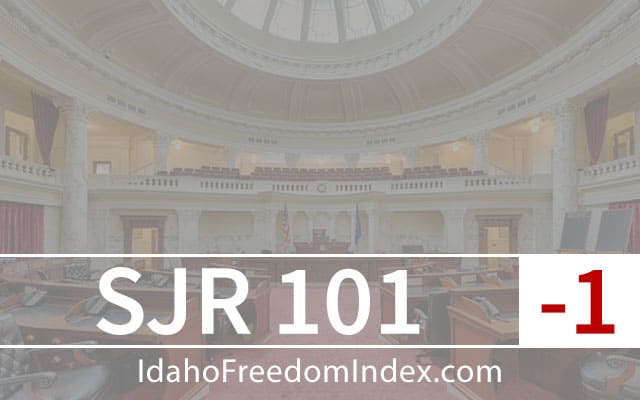


By Phil Haunschild and Fred Birnbaum
Bill description: SJR 101 would propose an amendment to the Idaho Constitution to expand the rights of crime victims in the state.
Rating: -1
Analysts’ Note: Last year, HJR 8 proposed similar victim protection amendments to the state constitution. However, it also included language which specified that the state government was not creating these new rights. Instead, the amendments stated it would be “the responsibility of government to protect the rights of crime victims.” While it may appear that this is the inherent responsibility of government, the change in HJR 8 took the language in Article I, Section 22, of the state Constitution from “Rights of Crime Victims,” to “The Responsibility of Government to Protect the Rights of Crime Victims.” We believe that this distinction is important because without this change, any additions to the rights enumerated under Section 22 are additional rights not granted by the current Idaho constitution.
For HJR 101 to fit in within the proper role of government, the amendments it proposes would need to pull out the language which enumerates the rights of crime victims and instead specify that it is the obligation or responsibility of the government to protect the victims of crime.
Does it violate the spirit or the letter of either the US Constitution or the Idaho Constitution? Examples include restrictions on speech, public assembly, the press, privacy, private property, or firearms. Conversely, does it restore or uphold the protections guaranteed in the US Constitution or the Idaho Constitution?
SJR 101 would depart from the traditional practice of both the Idaho Constitution and U.S. Constitution of securing the population from government infringements on their rights. Instead, it would further establish a new right under the Idaho Constitution, under Article I, Section 22, by adding subsection 10.
As Thomas Jefferson aptly stated in the Declaration of Independence:
“We hold these truths to be self-evident, that all men are created equal, that they are endowed by their creator with certain inalienable Rights, that among these are Life, Liberty and the pursuit of Happiness. — That to secure these rights, Governments are instituted among Men” (emphasis added).
The rights enumerated in the First through Ninth Amendments to the U.S. Constitution specifically state that the government shall not infringe on the rights of the people. For example, the First Amendment states that “Congress shall make no law” infringing on “the right of the people.”
SJR 101 would take the opposite approach in amending the Idaho Constitution. This amendment would leave in the language which states that “a crime victim has the following rights” and proceeds to list out 11 rights which victims are granted by the state. Subsection 10 is added as follows: This amendment would enumerate a new right to this list: “reasonable protection from the accused and those acting on behalf of the accused throughout the criminal justice process.”
The question presented to the electors of Idaho would specifically state that these amendments would provide additional rights to crime victims. Electors would be presented with the following question: “Shall Section 22, Article I, of the Constitution of the State of Idaho be amended to provide additional rights to crime victims.”
Rather than securing the inalienable rights which Idahoans already have — and which the government may not infringe — adding this new language would establish a new right. This would turn the government into an arbiter of rights rather than a securer of rights, as both the Idaho and U.S. Constitution delineate. Once the government becomes the arbiter of rights, there is no recourse to stop the imposition of universal health care, uniform education, or a variety of other programs as a right which the government would be obligated to provide.
(-1)
However, SJR 101 would further protect the rights of the accused which are guaranteed in the U.S. Constitution. The amendment to the Idaho Constitution would specifically state, in subsection (11) (D), that “nothing in this section is intended to, or shall be interpreted to, supersede an accused's federal constitutional rights.”
(+1)
Does it increase government spending (for objectionable purposes) or debt? Conversely, does it decrease government spending or debt?
The Fiscal Note for SJR 101 estimates that the cost to counties and local governments could be as high as $553,000 to implement the new requirements for reasonable and timely notification of all victims. Included in this cost would be up to an additional 13.2 employees working for public entities across the state to implement the new provisions of this constitutional amendment.
Proponents of the measure argue that this cost could likely be reduced as counties and local governments find areas to share resources and find efficiencies. Opponents have argued that these costs could be much higher than anticipated, as has been the case in many other states which have implemented victim’s rights amendments into their own constitutions (Idaho does, however, have a portion of the notification requirements already in the Constitution, which SJR 101 would expand upon.)
(-1)


